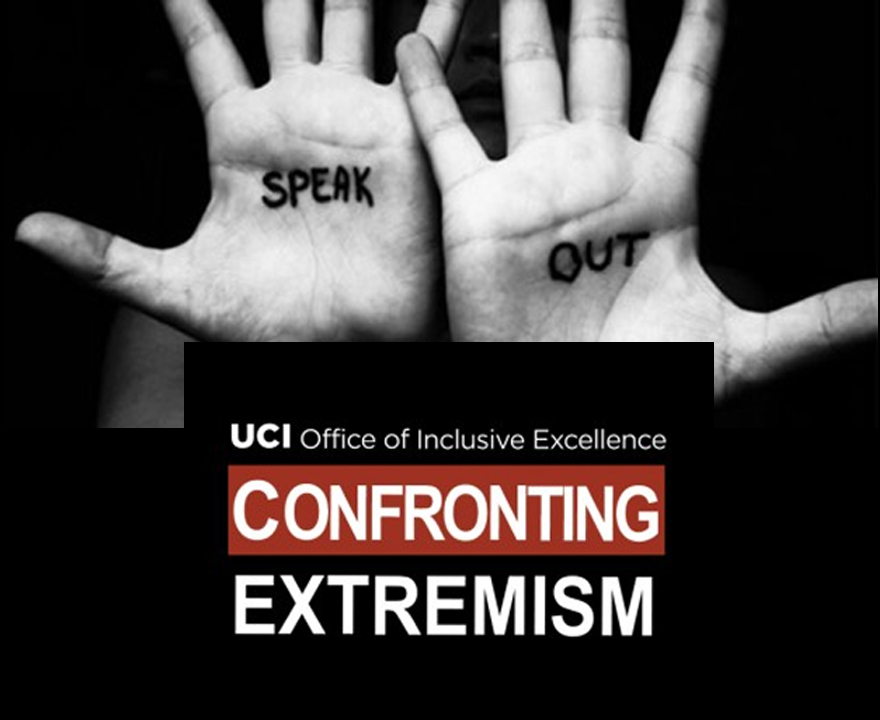UCI launches new open online course on confronting digital extremism

UCI launches new open online course on confronting digital extremism
- August 8, 2019
- Funding provided by UCI Office of Inclusive Excellence’s initiative on confronting extremism
-----
The School of Social Sciences at UC Irvine, in collaboration with the UCI Vice Chancellor for Equity, Diversity and Inclusion, is committed to providing tools and resources to respond to hate groups and incidents of violent extremism that exploit the digital tools of our online lives.
"Confronting Digital Extremism," a newly launched online course designed for use in high school and college classrooms, will aid in the effort. Funded by the Office of Inclusive Excellence’s Confronting Extremism Initiative, the course is available on UCI Open, the campus platform for open and free public courseware.
“Two related concerns motivated our project: the proliferation of disinformation through social media and other online platforms around the 2016 US Presidential election; and the growing visibility of far-right extremist hate groups and violence, especially in the wake of August 2017’s ‘Unite the Right’ rally in Charlottesville, Virginia,” says Stephen Rea, UCI anthropology Ph.D. ’15 and current postdoctoral scholar who co-created the course. “While neither coordinated media manipulation nor far-right political extremism are new phenomena in American society, the ways in which disinformation campaigners and hate-based ideologues have exploited the digital media ecosystem’s technological affordances present clear threats to the ideals of democratic communities that demand critical attention and understanding if they are to be confronted.”
Hear from UC Irvine professors Cailin O'Connor and James Weatherall, logic and philosophy of science, on "The Misinformation Age"
Rea worked with Bill Maurer, UCI anthropology and law professor and social sciences dean, to craft four modules covering case studies in digital extremism, similarities between internet trolls and extremists, ways in which online algorithmic processes are exploited to drive targeted narratives, and how online extremism can be combatted. The course combines video lectures, readings, classroom activities, and relevant video clips highlighting real world examples that make the heavy content digestible and engaging for high school and college student audiences. The course also provides instruction on how to learn more about populations more vulnerable to the persuasive effects of digital extremism.
Hear from researcher Danah Boyd on digital media literacy for our era, at South by Southwest
“University campuses are far from immune to these threats; college students who are participating in the political process for the first time are exposed to mis- and disinformation campaigns through their social media activities, and there is abundant evidence that far-right groups are looking at college students for recruitment,” says Maurer. “By educating our diverse students about the different modes of extremist activity that exist in online environments and equipping them with effective means of confronting it, we hope to break the amplification and reduce the spread of hate online, ultimately building a more robust digital civics and promoting the values of inclusion and civic responsibility both online and off.”
Check out these other helpful resources from the Data & Society Research Institute on digital extremism:
-----
Would you like to get more involved with the social sciences? Email us at communications@socsci.uci.edu to connect.
Share on:
Related News Items
- Careet RightThree UC Irvine professors named co-editors of prestigious Law & Society Review
- Careet RightWhy some payments companies want to be banks
- Careet RightFormer NYC mayor Eric Adams accused of crypto scam shortly after leaving office
- Careet RightThe penny stops here: As 200-year-old coin ends its run, retailers face costly shift without clear rules
- Careet RightBanks plead for federal guidance as penny shortage spreads


